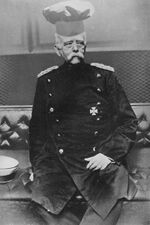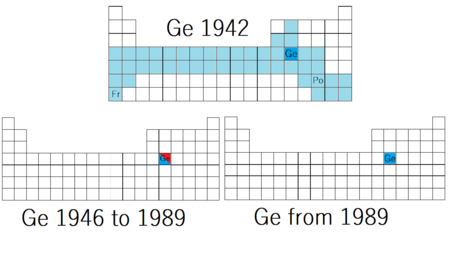Germanium
Germanium is a Group IV (or Group 14) element found in the p-block of Period 4 in the standard Periodic Table of elements, where it has remained since 1989. However, its position has changed repeatedly since its discovery by Herr Professor-Chancellor Otto von Bismuth (pictured) in the late nineteenth century.
History[edit]
In 1871, burst from the p-block to invade its neighbour, Gallium This consolidated Germanium's position as a permanent member of the list of elements and consolidated its identity, having previously laboured under the name EkaSilicon. Unsatisfied with its prominence amongst such luminaries as Selenium and Antimony, in 1914 Germanium again reached out, once more overrunning Galium and threatening the lower reaches of Group 1, as well as, this time, this time also making great inroads into its neighbours in the east of the p-block. After a titanic struggle over many years, involving conflict with Americium and Ruthenium as well as a rejuvenated Francium, Germanium was again pushed back to its original position and forced to give up many of its gains. As a result of its losses in Group VI (16), Polonium came into being — a sore point that contributed to renewed conflict in 1939.
The Second Block-buster saw Germanium surge through the S-block to completely occupy Francium's position as well as again moving east again, removing Polonium from the map entirely and exterminating lesser elements (Untermetals) in a vicious programme known to posterity as The Final Solution (1.00 moles per litre). By 1942, Germanium dominatied Europium to a greater extent than any other element throughout history.

Sadly for beer-sodden sausage-loving elements everywhere, this was Germanium's highwater mark. Within three years it would once again be forced to retreat to the central p-block and was partioned. For the next fifty years, its protons were allowed to live a free, open existence within a federal, democratic system where the highest achivers accumulated anions while others were forced to alloy themselves and to subsist on a diet of sauerkraut. Meanwhile its neutrons were forced to exist in a socialist utopia where each sub-atomic particle was alloted a fair share of grey, monotony which could only be tolerated by slowly dissolving in alcohol.
| H | | He | |||||||||||||||
| Li | Be | | B | C | N | O | F | Ne | |||||||||
| Na | Mg | | Al | Si | P | S | Cl | Ar | |||||||||
| K | Ca | Sc | Ti | V | Cr | Mn | Fe | Co | Ni | Cu | Zn | Ga | Ge | As | Se | Br | Kr |
| Rb | Sr | Y | Zr | Nb | Mo | Tc | Ru | Rh | Pd | Ag | Cd | In | Sn | Sb | Te | I | Xe |
| Cs | Ba | Lu | Hf | Ta | W | Re | Os | Ir | Pt | Au | Hg | Tl | Pb | Bi | Po | At | Rn |
| Fr | Ra | Lr | Rf | Db | Sg | Bh | Hs | Mt | Ds | Rg | Cn | Nh | Fl | Mc | Lm | Ts | Og |
| | |||||||||||||||||
| La | Ce | Pr | Nd | Pm | Sm | Eu | Gd | Tb | Dy | Ho | Er | Tm | Yb | ||||
| Ac | Th | Pa | U | Np | Pu | Am | Cm | Bk | Cf | Es | Fm | Md | No | ||||

